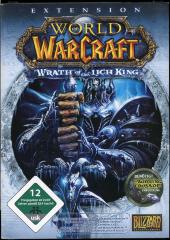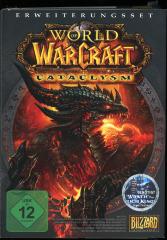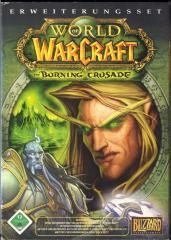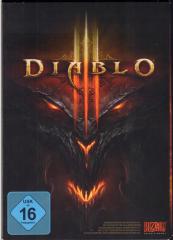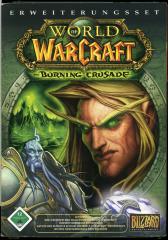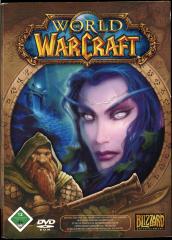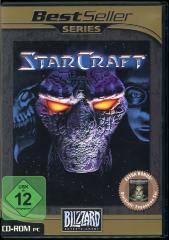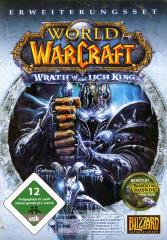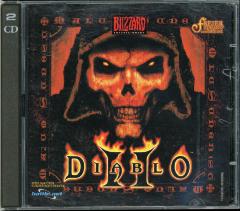Blizzard Entertainment Inc.
Wikipedia
The following text is automatically retrieved from the German Wikipedia. To follow links in the Wikipedia article, please click here.

Blizzard Entertainment, Inc. is an American video game developer and publisher based in Irvine, California, and is a subsidiary of the American company Activision Blizzard. The company was founded on February 8, 1991, under the name Silicon & Synapse, Inc. by three graduates of the University of California, Los Angeles: Michael Morhaime, Frank Pearce and Allen Adham. The company originally concentrated on the creation of game ports for other studios' games before beginning development of their own software in 1993 with games like Rock n' Roll Racing and The Lost Vikings. In 1994 the company became Chaos Studios, Inc., then Blizzard Entertainment after being acquired by distributor Davidson & Associates.
Shortly thereafter, Blizzard released Warcraft: Orcs & Humans. Blizzard created several other video games, including Warcraft sequels, the Diablo series, the StarCraft series, and in 2004 the massively multiplayer online role-playing game World of Warcraft. Their most recent projects include the first expansion for Diablo III, Reaper of Souls, the online collectible card game Hearthstone, the sixth expansion for World of Warcraft, Legion, the multiplayer online battle arena Heroes of the Storm, the third and final expansion for StarCraft II: Wings of Liberty, Legacy of the Void, and the multiplayer first-person hero shooter Overwatch.
On July 9, 2008, Activision merged with Vivendi Games, culminating in the inclusion of the Blizzard brand name in the title of the resulting holding company. On July 25, 2013, Activision Blizzard announced the purchase of 429 million shares from majority owner Vivendi. As a result, Activision Blizzard became a completely independent company.
Blizzard Entertainment hosts conventions for fans to meet and to promote their games: the BlizzCon in California, United States, and the Blizzard Worldwide Invitational in other countries, including South Korea and France.
History
Blizzard Entertainment was founded by Michael Morhaime, Allen Adham, and Frank Pearce as Silicon & Synapse on February 8, 1991, a year after all three had received their bachelor's degrees from UCLA. To found the company, each of them contributed about $10,000, which in the case of Morhaime, he got as part of an interest-free loan from his grandmother. During the first two years, the company focused on creating game ports for other studios. Ports include titles such as J.R.R. Tolkien's The Lord of the Rings, Vol. I and Battle Chess II: Chinese Chess. In 1993, the company developed games such as Rock n' Roll Racing and The Lost Vikings (published by Interplay Productions).
In early 1994, they were acquired by distributor Davidson & Associates for $6.75 million ($11.1 million today). That same year the company briefly changed its name to Chaos Studios, before finally settling on Blizzard Entertainment (after it was discovered that another company with the Chaos name already existed). Shortly thereafter, Blizzard shipped their breakthrough hit Warcraft: Orcs & Humans.
Blizzard has changed hands several times since then. Davidson was acquired along with Sierra On-Line by a company called CUC International in 1996. CUC then merged with a hotel, real-estate, and car-rental franchiser called HFS Corporation to form Cendant in 1997. In 1998 it became apparent that CUC had engaged in accounting fraud for years before the merger. Cendant's stock lost 80% of its value over the next six months in the ensuing widely discussed accounting scandal. The company sold its consumer software operations, Sierra On-line (which included Blizzard) to French publisher Havas in 1998, the same year Havas was purchased by Vivendi. Blizzard was part of the Vivendi Games group of Vivendi. In July 2008 Vivendi Games merged with Activision, using Blizzard's name in the resulting company, Activision Blizzard.
In 1996, Blizzard acquired Condor Games, which had been working on the game Diablo for Blizzard at the time. Condor was renamed Blizzard North, and has since developed the games Diablo, Diablo II, and its expansion pack Lord of Destruction. Blizzard North was located in San Mateo, California. The company originated in Redwood City, California.
Blizzard launched their online gaming service Battle.net in January 1997 with the release of their action role-playing game Diablo. In 2002, Blizzard was able to reacquire rights for three of its earlier Silicon & Synapse titles, The Lost Vikings, Rock n' Roll Racing and Blackthorne, from Interplay Entertainment and re-release them for Game Boy Advance, a handheld console. In 2004, Blizzard opened European offices in the Paris suburb of Vélizy, Yvelines, France. On May 16, 2005, Blizzard announced the acquisition of Swingin' Ape Studios, a video game developer which had been developing StarCraft: Ghost. The company was then merged into Blizzard's other teams after StarCraft: Ghost was "postponed indefinitely". On August 1, 2005, Blizzard announced the consolidation of Blizzard North into the headquarters at 131 Theory in UC Irvine's University Research Park in Irvine, California. In 2007, Blizzard moved their headquarters to 16215 Alton Parkway in Irvine, California.
On November 23, 2004, Blizzard released World of Warcraft, a massively multiplayer online role-playing game. World of Warcraft is the fourth released game set in the fantasy Warcraft universe, which was first introduced by Warcraft: Orcs & Humans in 1994. Blizzard announced World of Warcraft on September 2, 2001. The game was released on November 23, 2004, on the 10th anniversary of the Warcraft franchise.
The first expansion set of the game, The Burning Crusade, was released on January 16, 2007. The second expansion set, Wrath of the Lich King, was released on November 13, 2008. The third expansion set, Cataclysm was released on December 7, 2010. Mists of Pandaria and Warlords of Draenor, were released respectively on September 25, 2012 and November 13, 2014. The most recent expansion, Legion, was released on August 30, 2016.
Having peaked at 12 million monthly subscriptions in 2010, World of Warcraft subscriptions sunk to 6.8 million in 2014, the lowest number since the end of 2006, prior to The Burning Crusade expansion. However, World of Warcraft is still the world's most-subscribed MMORPG, and holds the Guinness World Record for the most popular MMORPG by subscribers. In April 2008, World of Warcraft was estimated to hold 62 percent of the MMORPG subscription market. In 2008, Blizzard was honored at the 59th Annual Technology & Engineering Emmy Awards for the creation of World of Warcraft. Mike Morhaime accepted the award.
In 2012 Blizzard had 4,700 employees, with offices across 11 cities including Austin, Texas, and countries around the globe. As of June 2015, the company's headquarters in Irvine, California had 2,622 employees.
Blizzard announced in September 2017 that it had acquired a studio at The Burbank Studios in Burbank, California, that will convert into the Blizzard Arena Los Angeles, featuring multiple sound stages, control rooms, practice facilities, a merchandise store, and seating for up to 450 spectators. Blizzard will use the venue to support its various eSports, starting with the Overwatch Contenders Season One in October 2017. Blizzard presently plans to use this only for their events but may allow other eSports leagues to use it in the future.
Key employees
- Michael Morhaime – Co-founder, President (1991–present)
- Allen Adham – Founder, Senior Vice-President, Executive Producer and former President (1991–2004, 2016–present)
- Frank Pearce Jr. – Co-founder, Senior Vice-President, Chief Design Officer (1991–present)
- Samwise Didier – Senior Art Director (1992–present)
- Bobby Fisher – Technical Director (1992–present)
- Matt Samia – Vice-President/Cinematics & Media (1995–present)
- Alan Dabiri – Technical Director (1995–present)
- Jeff Chamberlain – Cinematics Director (2000–present)
- Dustin Browder – Game Director (2007–present)
- Jeff Kaplan – Game Director (Overwatch, 2002–present)
- Ion Hazzikostas – Game Director (World of Warcraft, 2008–present)
Former key employees
- Patrick Wyatt – First hire and eventual Vice-President of Research & Development (1991–2000)
- David Brevik – Co-Founder and President of Blizzard North/Director at Blizzard Ent. (1993–2003)
- Mike O'Brien – Company Director and Lead Programmer (1995–2000)
- Bill Roper – Vice-President of Blizzard North/Director at Blizzard Ent. (1994–2003)
- Sam Lantinga – Lead Software Engineer (2001–2011)
- Greg Street – Lead Systems Designer (2008–2013)
- Alex Mayberry – Lead Game Producer (2004–2014)
- Shane Dabiri – Lead Producer (1994–2014)
- Rob Pardo – Executive Vice-President of Game Design (1998–2014)
- Joeyray Hall – DVD/Video production supervisor (1991–2015)
- Paul W. Sams – Chief Operating Officer (1996–2015)
- Nick Carpenter – Executive Art Director (1994–2016)
- Josh Mosqueira – Game Director (2011–2016)
- Chris Metzen – Vice-President of Creative Development (1994–2016)
- Ben Brode – Game Director (Hearthstone, 2008–2018)
Games
Games developed
Ports
These games were ported while the company was known as Silicon & Synapse.
Main franchises
Currently, Blizzard has four main franchises: Warcraft, Diablo, StarCraft, and Overwatch. Each franchise is supported by other media based around its intellectual property such as novels, collectible card games, comics and video shorts. Blizzard Entertainment announced in 2006 that they would be producing a Warcraft live-action movie. The movie was directed by Duncan Jones, financed and produced by Legendary Pictures, Atlas Entertainment, and others, and distributed by Universal Pictures. It was released in June 2016.
Unreleased games
Notable unreleased titles include Warcraft Adventures: Lord of the Clans, which was canceled on May 22, 1998, Shattered Nations, and StarCraft: Ghost, which was "Postponed indefinitely" on March 24, 2006 after being in development hell for much of its lifespan. After seven years of development, Blizzard revealed the cancellation of an unannounced MMO codenamed "Titan" on September 23, 2014. The company also has a history of declining to set release dates, choosing to instead take as much time as needed, generally saying a given product is "done when it's done."
Pax Imperia II was originally announced as a title to be published by Blizzard. Blizzard eventually dropped Pax Imperia II, though, when it decided it might be in conflict with their other space strategy project, which became known as StarCraft. THQ eventually contracted with Heliotrope and released the game in 1997 as Pax Imperia: Eminent Domain.
Technology
Warden client
Blizzard has made use of a special form of software known as the 'Warden Client'. The Warden client is known to be used with Blizzard's online games such as Diablo and World of Warcraft, and the Terms of Service contain a clause consenting to the Warden software's RAM scans while a Blizzard game is running.
The Warden client scans a small portion of the code segment of running processes in order to determine whether any third-party programs are running. The goal of this is to detect and address players who may be attempting to run unsigned code or third party programs in the game. This determination of third party programs is made by hashing the scanned strings and comparing the hashed value to a list of hashes assumed to correspond to banned third party programs. The Warden's reliability in correctly discerning legitimate versus illegitimate actions was called into question when a large scale incident happened. This incident banned many Linux users after an update to Warden caused it to incorrectly detect Cedega as a cheat program. Blizzard issued a statement claiming they had correctly identified and restored all accounts and credited them with 20 days play. Warden scans all processes running on a computer, not just the game, and could possibly run across what would be considered private information and other personally identifiable information. It is because of these peripheral scans that Warden has been accused of being spyware and has run afoul of controversy among privacy advocates.
Battle.net 2.0
Blizzard released its revamped Battle.net service in 2009. This service allows people who have purchased Blizzard products (StarCraft, StarCraft II, Diablo II, and Warcraft III, as well as their expansions) to download digital copies of games they have purchased, without needing any physical media.
On November 11, 2009, Blizzard required all World of Warcraft accounts to switch over to Battle.net accounts. This transition means that all current Blizzard titles can be accessed, downloaded, and played with a singular Battle.net login.
Battle.net 2.0 is the platform for matchmaking service for Blizzard games, which offers players a host of additional features. Players are able to track their friend's achievements, view match history, avatars, etc. Players are able to unlock a wide range of achievements (rewards for completing game content) for Blizzard games.
The service allows players to chat simultaneously with players from other Blizzard games. For example, players no longer need to create multiple user names or accounts for most Blizzard products. To enable cross game communication, players need to become either Battletag or Real ID friends.
Privacy controversy and Real ID
On July 6, 2010, Blizzard announced that they were changing the way their forums worked to require that users identify themselves with their real name. The reaction from the community was overwhelmingly negative with multiple game magazines calling the change "foolhardy" and an "epic fail". It resulted in a significant user response on the Blizzard forums, including one thread on the issue reaching over 11,000 replies. This included personal details of a Blizzard employee who gave his real name "to show it wasn't a big deal". Shortly after revealing his real name, forum users posted personal information including his phone number, picture, age, and home address.
Some technology media outlets suggested that displaying real names through Real ID is a good idea and would benefit both Battle.net and the Blizzard community. But others were worried that Blizzard was opening their fans up to real-life dangers such as stalking, harassment, and employment issues, since a simple Internet search by someone's employer can reveal their online activities.
Blizzard initially responded to some of the concerns by saying that the changes would not be retroactive to previous posts, that parents could set up the system so that minors cannot post, and that posting to the forums is optional. However, due to the huge negative response, Blizzard President Michael Morhaime issued a statement rescinding the plan to use real names on Blizzard's forums for the time being.
Apart from the negative side effects of Real ID relating to privacy, the addition boasts features for current Blizzard titles. For instance, real names for friends, cross-realm and cross-game chat, rich presence and broadcasts are included with the Real ID system.
Legal disputes
StarCraft privacy lawsuit
In 1998, Donald P. Driscoll, an Albany, California attorney filed a suit on behalf of Intervention, Inc., a California consumer group against Blizzard Entertainment for "unlawful business practices" for the action of collecting data from a user's computer without their permission.
FreeCraft
On June 20, 2003, Blizzard issued a cease and desist letter to the developers of an open source clone of the Warcraft engine called FreeCraft, claiming trademark infringement. This hobby project had the same gameplay and characters as Warcraft II, but came with different graphics and music.
As well as a similar name, FreeCraft enabled gamers to use Warcraft II graphics, provided they had the Warcraft II CD. The programmers of the clone shut down their site without challenge. Soon after that the developers regrouped to continue the work by the name of Stratagus.
World of Warcraft private server complications
On December 5, 2008, Blizzard issued a cease and desist letter to many administrators of high population World of Warcraft private servers (essentially slightly altered hosting servers of the actual World of Warcraft game, that players do not have to pay for). Blizzard used the Digital Millennium Copyright Act to influence many private servers to fully shut down and cease to exist.
Founder Electronics infringement lawsuit
On August 14, 2007, Beijing University Founder Electronics Co., Ltd. sued Blizzard Entertainment Limited for copyright infringement claiming 100 million yuan in damages. The lawsuit alleged the Chinese edition of World of Warcraft reproduced a number of Chinese typefaces made by Founder Electronics without permission.
MDY Industries, LLC v. Blizzard Entertainment, Inc.
On July 14, 2008, the United States District Court for the District of Arizona ruled on the case MDY Industries, LLC v. Blizzard Entertainment, Inc.. The Court found that MDY was liable for copyright infringement since users of its Glider bot program were breaking the End User License Agreement and Terms of Use for World of Warcraft. MDY Industries appealed the judgment of the district court, and a judgment was delivered by the Ninth Circuit Court of Appeals on December 14, 2010, in which the summary judgment against MDY for contributory copyright infringement was reversed. Nevertheless, they ruled that the bot violated the DMCA and the case was sent back to the district court for review in light of this decision.
Blizzard Entertainment, Inc. v. Valve Corporation
Shortly after Valve Corporation filed its trademark for "Dota" to secure the franchising rights for Dota 2, DotA-Allstars, LLC, run by former contributors to the games's predecessor, Defense of the Ancients, filed an opposing trademark in August 2010. DotA All-Stars, LLC was sold to Blizzard Entertainment in 2011. After the opposition was over-ruled in Valve's favor, Blizzard filed an opposition against Valve in November 2011, citing their license agreement with developers, as well as their ownership of DotA-Allstars, LLC. Blizzard conceded their case in May 2012, however, giving Valve undisputed commercial rights to Dota, while Blizzard would rename their StarCraft II: Heart of the Swarm mod "Blizzard All-Stars", which would become the stand-alone game, Heroes of the Storm.
Related companies
Over the years, some former Blizzard employees have moved on and established gaming companies of their own:
- Flagship Studios, creators of Hellgate: London, also worked on Mythos.
- ArenaNet, creators of the Guild Wars franchise.
- Ready at Dawn Studios, creators of The Order: 1886, Daxter, God of War: Chains of Olympus and an Ōkami port for the Wii.
- Red 5 Studios, creaters of Firefall, a free to play game MMOG.
- Castaway Entertainment, now defunct, after working on a game similar to the Diablo series, Djinn.
- Click Entertainment, creators of Throne of Darkness.
- Carbine Studios, released a massively multiplayer title WildStar.
- Turpitude Design, founded by Stieg Hedlund.
- Hyboreal Games, founded by Michio Okamura.
- Runic Games, founded by Travis Baldree, Erich Schaefer, and Max Schaefer; creators of Torchlight.
- Trion Worlds, released an MMORPG, Rift and an MMOFPS entitled Defiance with a MOBA game, End of Nations, placed on indefinite hiatus.
- Undead Labs, founded by Jeff Strain and worked on the video game State of Decay.
See also
- Blizzard North
- BlizzCon
References
External links
- Official website
External Links
→ Wikipedia
→ VIAF
Related work versions
Blizzard Entertainment Inc. worked on following work versions:


